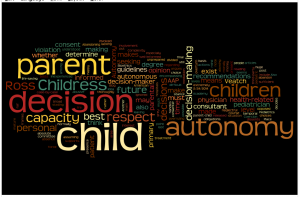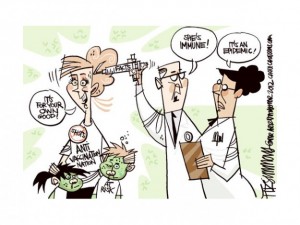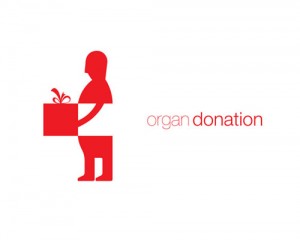What is the stance on children’s autonomy? How much involvement should a child have in a personal health-related decision? In “The Place of Autonomy in Bioethics,” Childress writes that “the presence, absence or degree of autonomy is a morally relevant characteristic” (Childress 312). This means that if we are deciding on the level of autonomy for a child, leaving them no opportunity for autonomous decision-making could be a possible violation of respect for autonomy.
Chlidress frames it perfectly: “Complexity of respect for personal autonomy.” In children especially, there is a huge grey area for making autonomous decisions with respect to healthcare. In 1995, the American Academy of Pediatrics released recommendations for pediatric decision-making. The AAP divided children into 3 levels of capacity: lacking, developing, and having capacity to make health-related decisions (Ross). The main guidelines regarding children with less capacity for making decisions include “seeking parental permission,” seeking “third-party mediation for parent-child disagreement,” and overruling the child’s decision if it goes against life-saving treatment. This seems fair, assuming that the child is inexperienced in life, unprepared to make an informed decision, and the parent makes a well-informed decision that is in the best interest of the family. For more mature children, the parent becomes a consultant rather than a consenter (Ross).
The major issue with the AAP recommendations is that no guidelines or tests exist to determine the level of decision-making capacity of a child! This means that the physician or pediatrician is the one who decides whether the parent will be a consultant or a primary decision-maker. Of course, if the parent makes a decision that is “abusive or neglectful,” the pediatrician can overturn that decision (Ross). Also, hospitals normally have an ethics committee that handles these kinds of situations, and issues are dealt with on a case-by-case basis.
Another important point to note is that people exist in and through time and their choices and actions occur over time” (Childress 310). A parent may be the primary decision-maker, but the parent must also think about the child’s future- will this child be happy in the future with the decision the parent made? Could this be a violation of autonomy if the child opposed the parent’s decision? What if the child was at an age that the degree of autonomy was sufficient, but the child’s opinion was still ignored? Childress supports this idea by stating “we also have to put that patient’s present consents and dissents in a broad temporal context encompassing both the past and the future” (Childress 310). Veatch argues against allowing the parents full consent, because they may not actually have the child’s best interests in mind- they think about money, parental obligations and their other children, among other things.
We must not abandon personal respect for autonomy, even in the situation that the patient is a child. A final decision should be balanced and thoroughly discussed and understood by all who are involved. Coercion or force should only be used as a last resort (Ross). In “Abandoning informed consent,” Veatch says “it would be extremely difficult to determine whether the absolute best choice has been made” by the parent, but after reading these articles I believe their decision should be considered above the child’s or the physician’s opinion.
References:
Childress, James F. “The place of autonomy in Bioethics.” Arguing About Bioethics. By Stephen Holland. London: Routledge, 2012. 308-316. Print.
Ross, Lainie Friedman. “Health Care Decisionmaking by Children Is It in Their Best Interest?” The Hastings Center Report. 27.6. (1997): 41-46. Blackwell Publishing Ltd. Web. 23 Feb 2014 http://dx.doi.org/10.2307/3527717.
Veatch, Robert M. “Abandoning informed consent.” Arguing About Bioethics. By Stephen Holland. London: Routledge, 2012. 317-328. Print.
http://www.wordle.net/show/wrdl/7588721/Wordle_Children_autonomy created by Jackie Glodener. 24 Feb 2014.



